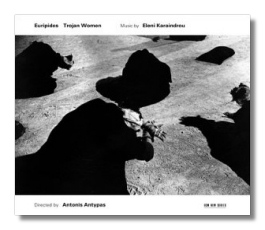
The Internet's Premier Classical Music Source
Related Links
- Latest Reviews
- More Reviews
-
By Composer
-
Collections
DVD & Blu-ray
Books
Concert Reviews
Articles/Interviews
Software
Audio
Search Amazon
Recommended Links
Site News
 CD Review
CD Review
Eleni Karaindrou

Trojan Women
Socratis Sinopoulos, Constantinople lyra, laouto
Christos Tsiamoulis, ney, suling, outi
Panos Dimitrakopoulos, kanonaki
Andreas Katsiyiannis, santouri
Maria Bildea, harp
Andreas Papas, bendir, daouli
Veronika Iliopoulou, soprano
Chorus of Captive Trojan Women/Antonis Kontogeorgiou
ECM New Series 1810 472139-2 DDD 49:49
Greek composer Eleni Karaindrou has written incidental music for more than 40 plays and for 20 full-length films. Several of her film scores – Eternity and a Day, Ulysses' Gaze, and The Suspended Step of the Stork – already have been released by ECM New Series. (There's also a "Music for Films" compilation on the same label.) This is the first time that ECM has presented her stage music, however, and what she has written for Euripides's Trojan Women is even more arrestingly moving than what her earlier work for films had led me to expect.
Specifically, Euripides's drama was adapted into modern Greek by K. X. Myris, and the production for which Karaindrou composed this music was directed by Antonis Antypas. This new production premièred on August 31, 2001; this recording was made in the month before the première. Karaindrou's talents are such that film directors have adapted their images to her music instead of vice-versa. Here, Antypas acknowledged the appropriateness and evocative power of Karaindrou's music by incorporating its performance into the play itself, particularly by the actresses who comprise the "Chorus of Captive Women."
Euripides's horrifying depiction of the human cost of warfare is as timely now as it was in 415 B.C. – the year in which Trojan Women was performed for the very first time. Karaindrou's uncanny music reaches back almost 25 centuries. Like the play's subject, the music literally transcends time. Place is transcended by the use of instruments associated with Mediterranean territories other than just ancient Greece. Nevertheless, Karaindrou's music, far from a dry experiment in ethnomusicology, might be a channeling of Euripides's soul, or perhaps a channeling of the spirit of ancient Greece itself. Calling it "spellbinding" is more than just using a figure of speech.
With the assistance of producer Manfred Eicher, Karaindrou's music for Trojan Women retains its viability in the absence of the actual staged production. The thirty short tracks (most are about a minute in length) retain their identities, and, heard as a whole, the CD is neither disjointed nor repetitious, in spite of Karaindrou's economical style of composition. The booklet contains English translations of Myris's sung texts.
No one knows for sure what ancient Greek music sounded like. Eleni Karaindrou's music for Trojan Women probably comes very close in spirit, if not in letter.
Copyright © 2002, Raymond Tuttle


















